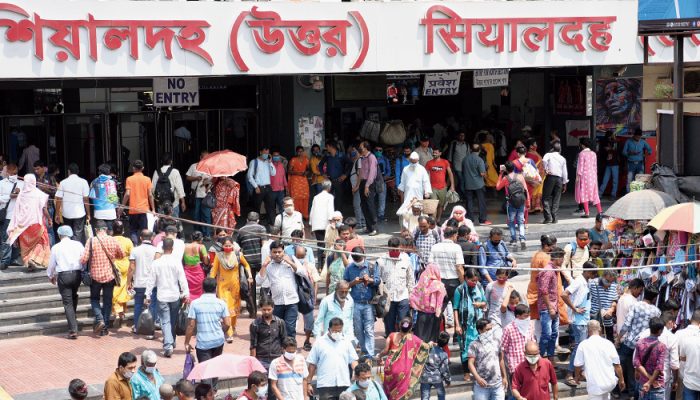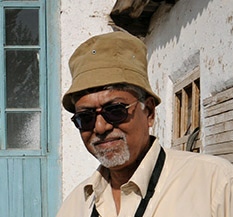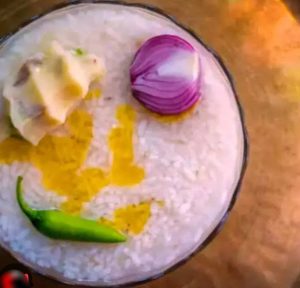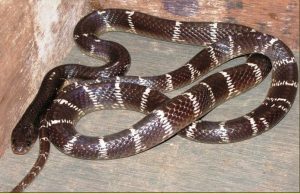A Nonsense Novelette
Chapter-2
The Foraging Days
The early college life for Chandu was fraught with dangers.
He had got admission in a college, which was a stone throw from Sealdah station and well reputed for its political fist fights, and lodged himself in the heavily recommended century-old boarding house at 6, Patuatola lane.
The college campus was thickly populated by fierce seniors, extra large, prowling in every nook and corner, who either glared at Chandu’s friendly smiles or smiled friendly to enquire about his political leanings. Once too often he would be picked up by a senior and sent on an errand, and if it was correctly performed, Chandu would be affectionately rewarded by a kick in the rear. The survival technique was of course to became invisible, which was well nigh impossible in Chandu’s case, as he had already learnt in his school days. A brief description of the physical attributes of Chandu here may well acquaint the reader with the facts.
Tall and lanky, Chandu, with his crew cropped hair, flapping ears and vacant popping eyes, if standing still, could be very intimidating to the crows in his father’s paddy fields. But standing still was not his forte, as his arms and legs appeared to be disjointed, having movements of their own, beyond Chandu’s control.
In the boarding house, he was lonely and forlorn, what with the rest of the boarders being fully occupied in close knit groups with either a pack of cards or endless violent debates or a board of ludo, a favourite Bengali indoor sport, ignoring Chandu altogether.
Chandu’s old school chum had already deserted him. He was showing signs of becoming taller, the English honours in the Calcutta environment seemed to be boosting his length and he was careful to avoid Chandu who had a mere Bachelor of Commerce up his sleeve.
So, one sunny afternoon, when the goings were a little too tough, Chandu drifted towards Sealdah with some ready cash to have a look around and venture into the Sanguvalley of which he had heard so much.
The first day he had landed in Calcutta, Chandu, like all first- timers, had been mesmerized by Sealdah. Thousands of people with remarkable variety of shapes and sizes scurrying across to and fro, all very busy, and hordes of hawkers, shouting themselves hoarse, while displaying their most inconceivable wares ranging from crematorium cots to, as Chandu hastily glanced away with reddening ears, ladies’ delicate undergarments.
Sealdah has a life of its own –a giant beehive –hordes of people rushing out of the station and vanishing among the thronging millions- hordes scurrying inside- very purposive- God knows what for.
A man in dirty clothes whispered in Chandu’s ears, “Chinese pen, 10 only.” Chandu hurried along—he had learned early to avoid Chinese goods—they could brand you a Naxalite for using one.
There was a vendor selling sugarcane juice—grinding the sugarcanes in a roller coaster machine with a bell making a twinkling sound as the man in a tattered banyan pushed hard, sweating profusely.
There was a lottery ticket seller in frayed clothes offering bumper prizes of crores of rupees and making a brisk sale with hungry-looking customers wearing more frayed clothes.
Chandu stood by a tea shop, mesmerized where the shop owner defied all laws of gravity by pouring tea from a container high up in his right hand into one in his left in an unbelievable angle.
There was so much to see. Pushed, elbowed and bumped incessantly, Chandu loitered at a pace decided by others, while taking in all the colourful displays on both sides of the streets, with the goal of ultimately devouring a mouthful of the so-called delicacy known as the “breast” cutlet at the Sanguvalley. This mystery item, introduced once in the school gossip by a classmate, who to everyone’s envy claimed to have tasted it, raised many heated debates as regards the exotic and forbidden nature of the name, with its somewhat cannibalistic appeal.
As his timidity intervened, Chandu hesitated near the restaurant patting on his cash, when a side show attracted his attention.
A lemon coloured man of indeterminable age was standing beside an upturned box, dangling in his hands what appeared to be a foot long cotton belt with a loop stitched at one end. When he caught the attention of Chandu and a couple of bystanders, he started coiling and uncoiling the belt round the loop, while inviting the onlookers to push a pencil inside the coiled loop. It was a simple game—if your pencil poked through the stitched loop, you won.
The lemon coloured man had dexterous hands no doubt, coiling and uncoiling in a flash, but if you looked closely as Chandu did, identifying the loop was not too difficult and the bet was a good one. If you won, you doubled whatever amount you put on board, and if you lost, you forfeited your money.
Such golden opportunities rarely present themselves, but Chandu, with his shrewd and cautious mind, still wavered. One of the others observing the show, simply attired, obviously a rustic villager on his first visit to Calcutta, hesitated no more, wagered a 50 rupee note, and as was expected, gleefully pocketed a hundred,
A second man, who had appeared to be in two minds like Chandu, now pushed forward with a ten-rupee note and was awarded with a twenty-rupee one.
It was obviously not the trickster’s day, but though looking a bit lost and disappointed, he was still in the game.
A plump policeman appeared with a red cap, a little askew, and a truncheon delicately balanced in one armpit looked nonchalantly on, while rubbing and massaging a ball of tobacco in his chubby hands. All within the purview of the law-the profile suggested. Chandu hesitated no more. He slapped a twenty-rupee note and lost. Perplexed, he was trying to shuffle away, when the winners, still hovering around, shouted words of encouragement, “Don’t go away losing your money. At least play another round and get your money back. It is easy.”
Chandu relented, his feudal spirits rekindled. Playing simple with the righteous indignation of getting his own back, he played another twenty rupee note and lost.
Chandu sneaked away after a glance at the plump policeman who, with all his palming, was lost in deep thoughts. After a lingering look at Sanguvalley he was drawing away forlorn when a polished-looking young man, meticulously dressed, obviously well-to-do, smiled at him and beckoned, “New at the college, eh? Seem to have seen you!”
Relieved to find someone who knew him, obviously a college senior with a kind heart among the sea of wild wolves, Chandu drew nearer.
“Let me give you a piece of advice,” the kind heart put a kind hand on Chandu’s shoulder, “these are slippery customers and avoid them like red hot bricks. You can never win. The first two winners before you are his cronies.”
Chandu looked back in wonder to see the whole troupe vanished, box and all, and was somewhat relieved.
“So what are you doing in Sealdah?” the kindred soul enquired, “planning to catch a train?”
“No, no, I was just planning to…,” here Chandu fumbled before pouring his heart out, “I was planning to have some grub to eat,” This last sentence was delivered with another passing glance at Sanguvalley.
“Go ahead, go ahead. There is Sanguvalley. Take another advice—try the breast cutlet. Delicious. Ah! Short of cash, eh? Come; let me offer you a treat. Now that you mention it, I am also yearning for a grab. Come, come, and don’t be shy.” The angel in human shape firmly escorted a feebly protesting Chandu to the shadowy and somewhat rickety interiors of the legendary institution.
The sizzling breast cutlet dipped in a spot of mustard sauce sent shivers down Chandu’s interiors and he reached a peak in heavenly ecstasy.
“Let’s have a second round, what? Don’t hesitate, dear. You can always pay me back some other day. Come, let’s finalize a programme—next week we will go to a great eatery in China Town. Of course it will be a little costly and you will be footing the bill, mind you. Ha, ha! So no scruples.”
Relieved, Chandu felt no scruples about the second round, which tasted even better than the first.
“Let’s have some good tea to round it off.” Clearly knowing his way around, the senior angel placed a firm order, “two cups of double half!”*
Unsure what this “double half” meant, Chandu sipped what tasted like any ordinary tea and mused dreamily on the superior nonchalance he would affect while discussing “double half” among friends, back in his village.
“Now for some cigs! I seem to have misplaced my own pack. You have none? Let me get some and enjoy it with the tea. Let’s see. Do you have some loose change?” The angel palmed the last ten-rupee-note Chandu still possessed and walked out leisurely among the milling crowd, never to be seen again.
Chandu was still in a trance sipping tea, when the waiter appeared, “your bill!”
Hopping against hope, Chandu mumbled, “I am waiting…. my senior….”
“Waiting for his senior…,” the waiter announced in a clear baritone for the benefit of presumably not only the cashier but also the other customers.
“Then he will have to wait for at least two days, going by past experience. Let him start washing the cups and plates,” the cashier was too busy with a pen and a ledger to look up and bother about trifles.
“You can start washing the cups and plates,” echoed the waiter in the same baritone.
“Look here I am a college student…,” sweating Chandu tried his best to sound indignant.
Now the cashier looked up, “College student, eh! So no experience in dish washing. Now what can we do with you?” He scrutinized Chandu closely from head to foot, “The shirt and trousers won’t do. The second hand market is not doing well and the bill,” he mused, “is sixty-five rupees.”
“Namaskar, Havildarji,” the cashier interrupted the flow of talk to salute the chubby policeman, who had by then started fondly patting the tobacco pulp. These fellows take their time in transporting delicacies to their oral cavity.
Formalities with the law over, the cashier turned his attention back, “Now let me have a look at your watch. I think this will do.” With expert hands, he unhinged Chandu’s gold-plated Rolex, latest model with automated calendar displays, and deposited it in a drawer full of watches of different makes. “Now if you can come back with the cash in two hours, you will have your watch back. Otherwise we will pawn it off.”
‘Chandu, homeward ho!’ Someone, possibly his guardian angel, seemed to be buzzing in his ears. He pushed off towards his lodging quarters minus his prize watch, the “breast cutlet” brazing away his throat and causing a grating sensation in his eyes.
The fleeting thoughts of retrieving the watch by returning with the cash, he resisted. He had a strong suspicion that if he returned to the lair, he would be relieved of the cash without having a second look at his watch.
______________________________________
*The chronicler, though unable to decipher the hidden implications of this brand of tea, can assure the reader that “double half” tea is still available at some vintage tea shops in the city.
(To be continued…)











